Psychology Case Study: Assessment, Treatment, and Care Planning
VerifiedAdded on 2022/09/08
|7
|1191
|21
Case Study
AI Summary
This case study presents an analysis of a psychological patient, Jane, focusing on her assessment, treatment, and care plan. The assignment begins with an exploration of appropriate therapeutic approaches, emphasizing talk therapy and the importance of establishing a strong nurse-patient relationship. It details a simulated conversation between a nurse and the patient to assess her memory and relationships. The care plan includes immediate actions for the first 72 hours, such as assessing the patient's mental condition using various tools, and a long-term care plan involving cognitive behavioral therapy and family involvement. The study highlights the need for patient-centered care, safety precautions, and the promotion of relaxation and recreation. It also emphasizes the importance of ongoing support and regular medical check-ups for the patient's recovery. References to relevant literature are included throughout the analysis.
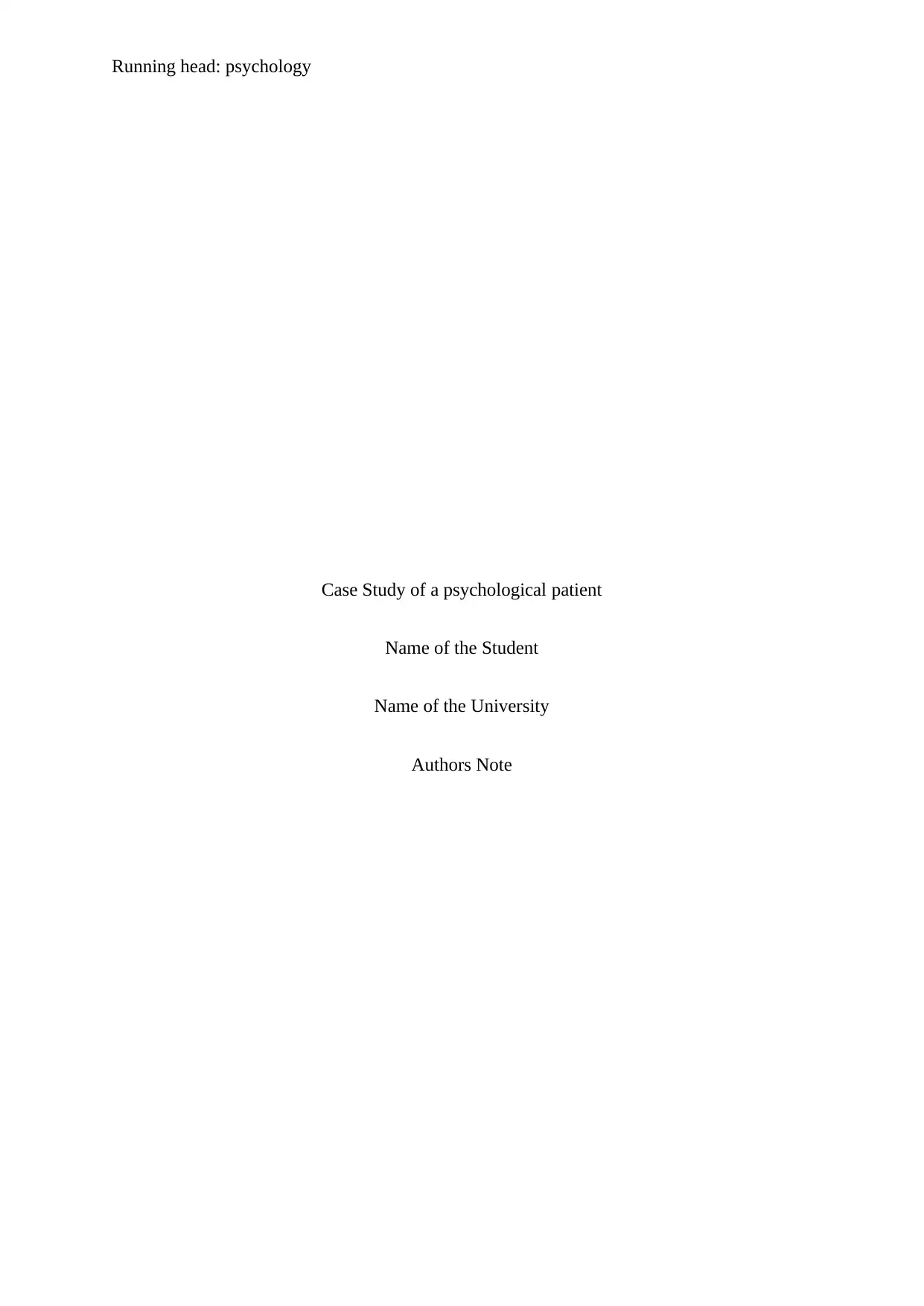
Running head: psychology
Case Study of a psychological patient
Name of the Student
Name of the University
Authors Note
Case Study of a psychological patient
Name of the Student
Name of the University
Authors Note
Paraphrase This Document
Need a fresh take? Get an instant paraphrase of this document with our AI Paraphraser
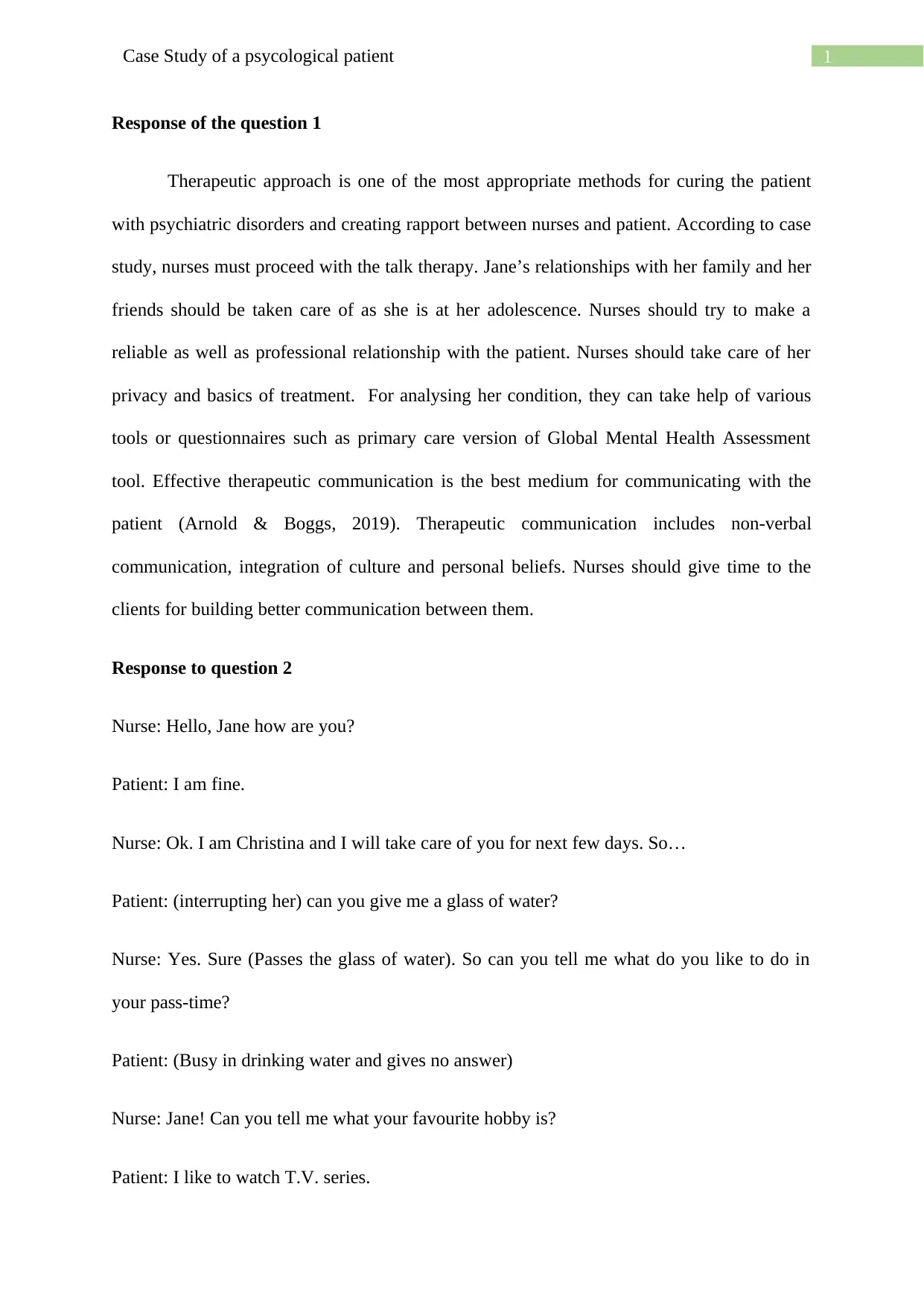
1Case Study of a psycological patient
Response of the question 1
Therapeutic approach is one of the most appropriate methods for curing the patient
with psychiatric disorders and creating rapport between nurses and patient. According to case
study, nurses must proceed with the talk therapy. Jane’s relationships with her family and her
friends should be taken care of as she is at her adolescence. Nurses should try to make a
reliable as well as professional relationship with the patient. Nurses should take care of her
privacy and basics of treatment. For analysing her condition, they can take help of various
tools or questionnaires such as primary care version of Global Mental Health Assessment
tool. Effective therapeutic communication is the best medium for communicating with the
patient (Arnold & Boggs, 2019). Therapeutic communication includes non-verbal
communication, integration of culture and personal beliefs. Nurses should give time to the
clients for building better communication between them.
Response to question 2
Nurse: Hello, Jane how are you?
Patient: I am fine.
Nurse: Ok. I am Christina and I will take care of you for next few days. So…
Patient: (interrupting her) can you give me a glass of water?
Nurse: Yes. Sure (Passes the glass of water). So can you tell me what do you like to do in
your pass-time?
Patient: (Busy in drinking water and gives no answer)
Nurse: Jane! Can you tell me what your favourite hobby is?
Patient: I like to watch T.V. series.
Response of the question 1
Therapeutic approach is one of the most appropriate methods for curing the patient
with psychiatric disorders and creating rapport between nurses and patient. According to case
study, nurses must proceed with the talk therapy. Jane’s relationships with her family and her
friends should be taken care of as she is at her adolescence. Nurses should try to make a
reliable as well as professional relationship with the patient. Nurses should take care of her
privacy and basics of treatment. For analysing her condition, they can take help of various
tools or questionnaires such as primary care version of Global Mental Health Assessment
tool. Effective therapeutic communication is the best medium for communicating with the
patient (Arnold & Boggs, 2019). Therapeutic communication includes non-verbal
communication, integration of culture and personal beliefs. Nurses should give time to the
clients for building better communication between them.
Response to question 2
Nurse: Hello, Jane how are you?
Patient: I am fine.
Nurse: Ok. I am Christina and I will take care of you for next few days. So…
Patient: (interrupting her) can you give me a glass of water?
Nurse: Yes. Sure (Passes the glass of water). So can you tell me what do you like to do in
your pass-time?
Patient: (Busy in drinking water and gives no answer)
Nurse: Jane! Can you tell me what your favourite hobby is?
Patient: I like to watch T.V. series.
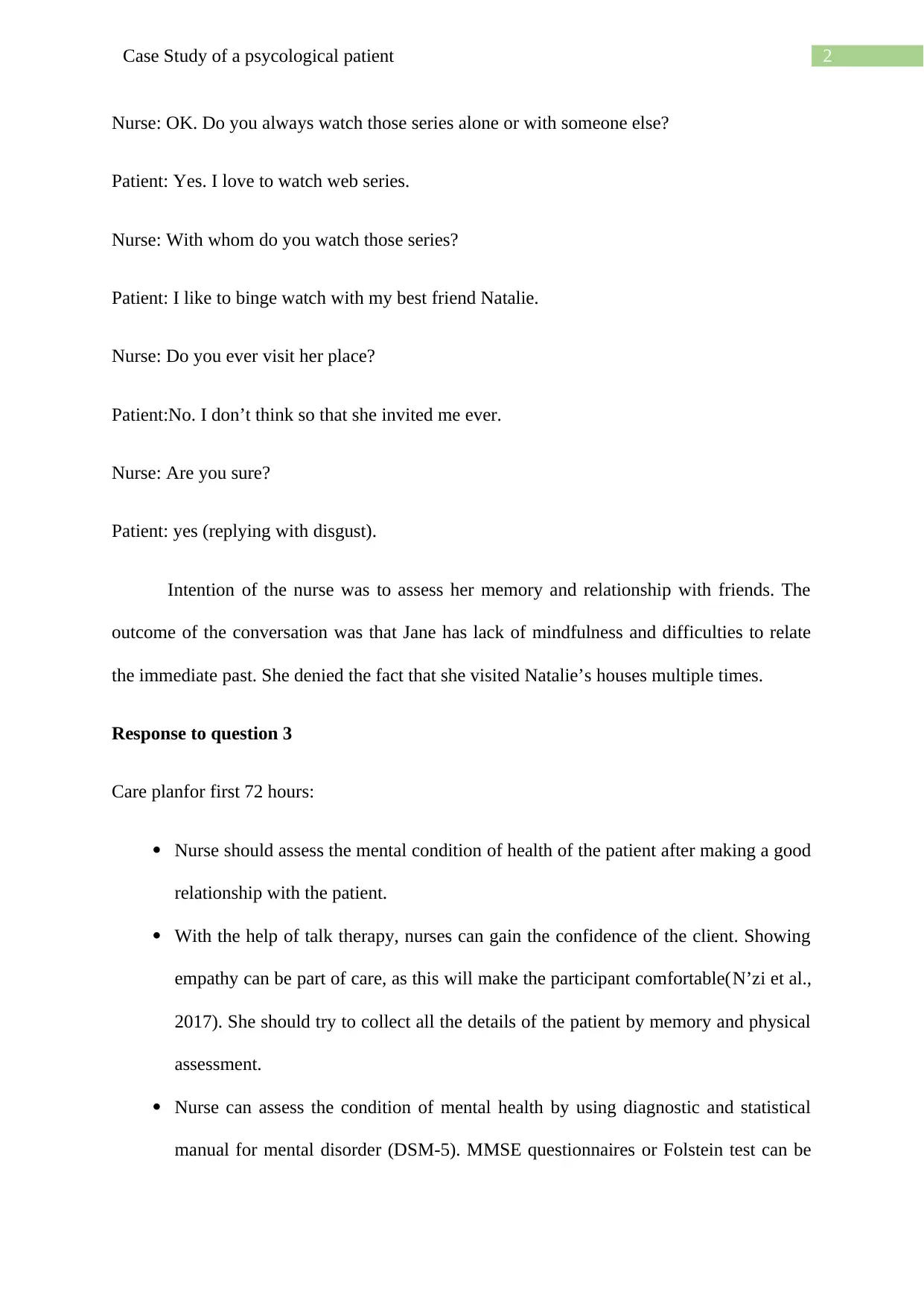
2Case Study of a psycological patient
Nurse: OK. Do you always watch those series alone or with someone else?
Patient: Yes. I love to watch web series.
Nurse: With whom do you watch those series?
Patient: I like to binge watch with my best friend Natalie.
Nurse: Do you ever visit her place?
Patient:No. I don’t think so that she invited me ever.
Nurse: Are you sure?
Patient: yes (replying with disgust).
Intention of the nurse was to assess her memory and relationship with friends. The
outcome of the conversation was that Jane has lack of mindfulness and difficulties to relate
the immediate past. She denied the fact that she visited Natalie’s houses multiple times.
Response to question 3
Care planfor first 72 hours:
Nurse should assess the mental condition of health of the patient after making a good
relationship with the patient.
With the help of talk therapy, nurses can gain the confidence of the client. Showing
empathy can be part of care, as this will make the participant comfortable(N’zi et al.,
2017). She should try to collect all the details of the patient by memory and physical
assessment.
Nurse can assess the condition of mental health by using diagnostic and statistical
manual for mental disorder (DSM-5). MMSE questionnaires or Folstein test can be
Nurse: OK. Do you always watch those series alone or with someone else?
Patient: Yes. I love to watch web series.
Nurse: With whom do you watch those series?
Patient: I like to binge watch with my best friend Natalie.
Nurse: Do you ever visit her place?
Patient:No. I don’t think so that she invited me ever.
Nurse: Are you sure?
Patient: yes (replying with disgust).
Intention of the nurse was to assess her memory and relationship with friends. The
outcome of the conversation was that Jane has lack of mindfulness and difficulties to relate
the immediate past. She denied the fact that she visited Natalie’s houses multiple times.
Response to question 3
Care planfor first 72 hours:
Nurse should assess the mental condition of health of the patient after making a good
relationship with the patient.
With the help of talk therapy, nurses can gain the confidence of the client. Showing
empathy can be part of care, as this will make the participant comfortable(N’zi et al.,
2017). She should try to collect all the details of the patient by memory and physical
assessment.
Nurse can assess the condition of mental health by using diagnostic and statistical
manual for mental disorder (DSM-5). MMSE questionnaires or Folstein test can be
⊘ This is a preview!⊘
Do you want full access?
Subscribe today to unlock all pages.

Trusted by 1+ million students worldwide
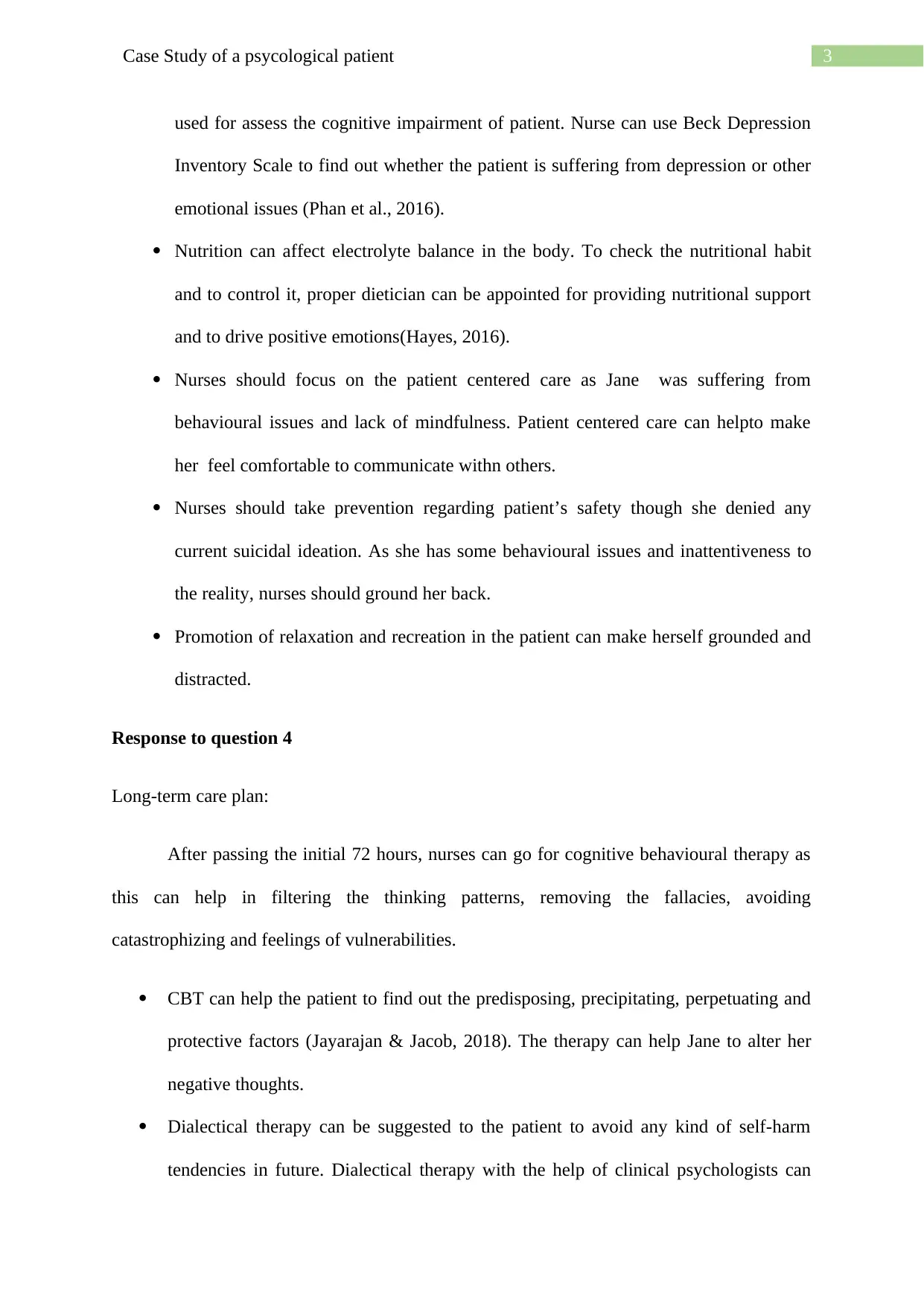
3Case Study of a psycological patient
used for assess the cognitive impairment of patient. Nurse can use Beck Depression
Inventory Scale to find out whether the patient is suffering from depression or other
emotional issues (Phan et al., 2016).
Nutrition can affect electrolyte balance in the body. To check the nutritional habit
and to control it, proper dietician can be appointed for providing nutritional support
and to drive positive emotions(Hayes, 2016).
Nurses should focus on the patient centered care as Jane was suffering from
behavioural issues and lack of mindfulness. Patient centered care can helpto make
her feel comfortable to communicate withn others.
Nurses should take prevention regarding patient’s safety though she denied any
current suicidal ideation. As she has some behavioural issues and inattentiveness to
the reality, nurses should ground her back.
Promotion of relaxation and recreation in the patient can make herself grounded and
distracted.
Response to question 4
Long-term care plan:
After passing the initial 72 hours, nurses can go for cognitive behavioural therapy as
this can help in filtering the thinking patterns, removing the fallacies, avoiding
catastrophizing and feelings of vulnerabilities.
CBT can help the patient to find out the predisposing, precipitating, perpetuating and
protective factors (Jayarajan & Jacob, 2018). The therapy can help Jane to alter her
negative thoughts.
Dialectical therapy can be suggested to the patient to avoid any kind of self-harm
tendencies in future. Dialectical therapy with the help of clinical psychologists can
used for assess the cognitive impairment of patient. Nurse can use Beck Depression
Inventory Scale to find out whether the patient is suffering from depression or other
emotional issues (Phan et al., 2016).
Nutrition can affect electrolyte balance in the body. To check the nutritional habit
and to control it, proper dietician can be appointed for providing nutritional support
and to drive positive emotions(Hayes, 2016).
Nurses should focus on the patient centered care as Jane was suffering from
behavioural issues and lack of mindfulness. Patient centered care can helpto make
her feel comfortable to communicate withn others.
Nurses should take prevention regarding patient’s safety though she denied any
current suicidal ideation. As she has some behavioural issues and inattentiveness to
the reality, nurses should ground her back.
Promotion of relaxation and recreation in the patient can make herself grounded and
distracted.
Response to question 4
Long-term care plan:
After passing the initial 72 hours, nurses can go for cognitive behavioural therapy as
this can help in filtering the thinking patterns, removing the fallacies, avoiding
catastrophizing and feelings of vulnerabilities.
CBT can help the patient to find out the predisposing, precipitating, perpetuating and
protective factors (Jayarajan & Jacob, 2018). The therapy can help Jane to alter her
negative thoughts.
Dialectical therapy can be suggested to the patient to avoid any kind of self-harm
tendencies in future. Dialectical therapy with the help of clinical psychologists can
Paraphrase This Document
Need a fresh take? Get an instant paraphrase of this document with our AI Paraphraser
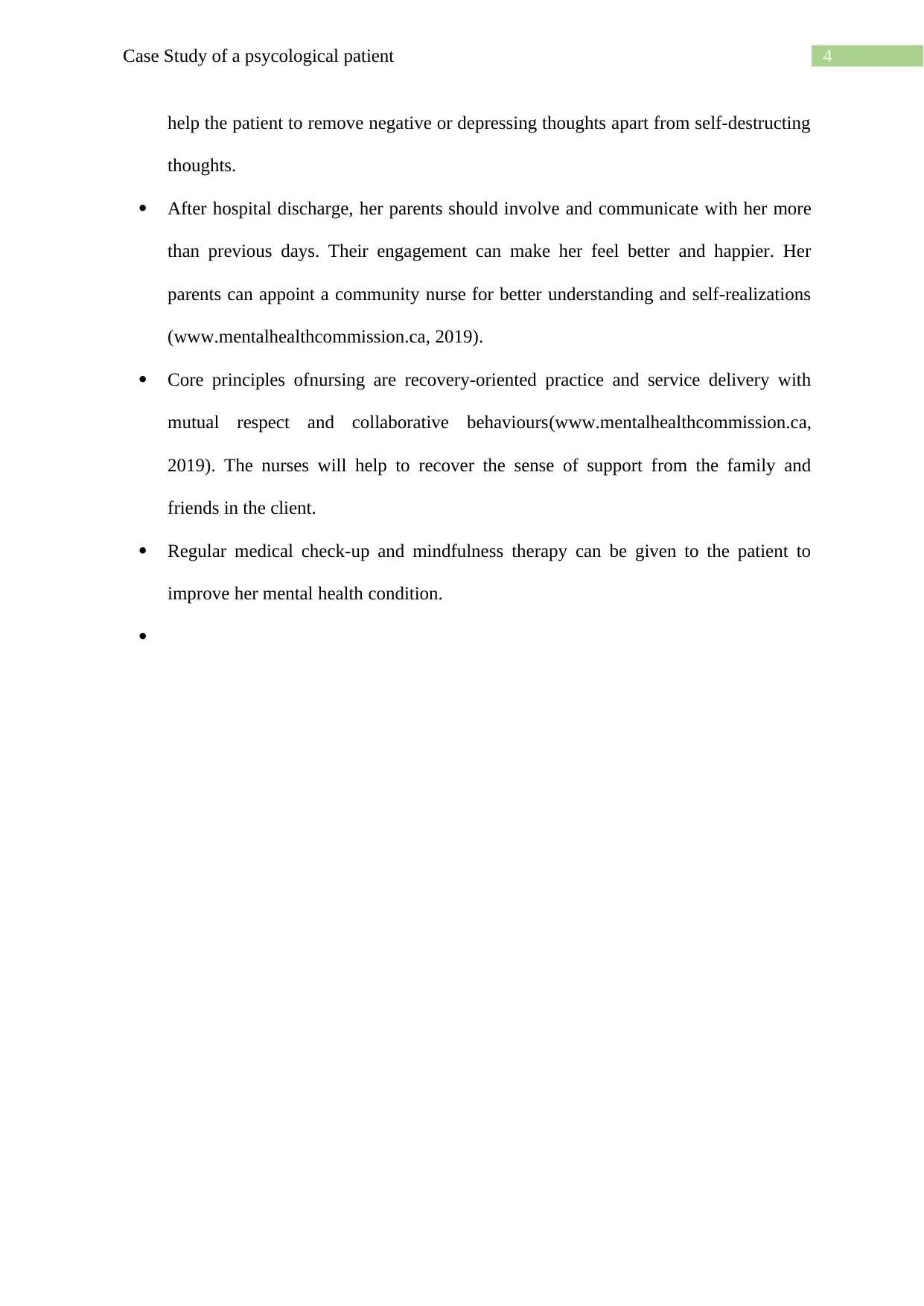
4Case Study of a psycological patient
help the patient to remove negative or depressing thoughts apart from self-destructing
thoughts.
After hospital discharge, her parents should involve and communicate with her more
than previous days. Their engagement can make her feel better and happier. Her
parents can appoint a community nurse for better understanding and self-realizations
(www.mentalhealthcommission.ca, 2019).
Core principles ofnursing are recovery-oriented practice and service delivery with
mutual respect and collaborative behaviours(www.mentalhealthcommission.ca,
2019). The nurses will help to recover the sense of support from the family and
friends in the client.
Regular medical check-up and mindfulness therapy can be given to the patient to
improve her mental health condition.
help the patient to remove negative or depressing thoughts apart from self-destructing
thoughts.
After hospital discharge, her parents should involve and communicate with her more
than previous days. Their engagement can make her feel better and happier. Her
parents can appoint a community nurse for better understanding and self-realizations
(www.mentalhealthcommission.ca, 2019).
Core principles ofnursing are recovery-oriented practice and service delivery with
mutual respect and collaborative behaviours(www.mentalhealthcommission.ca,
2019). The nurses will help to recover the sense of support from the family and
friends in the client.
Regular medical check-up and mindfulness therapy can be given to the patient to
improve her mental health condition.
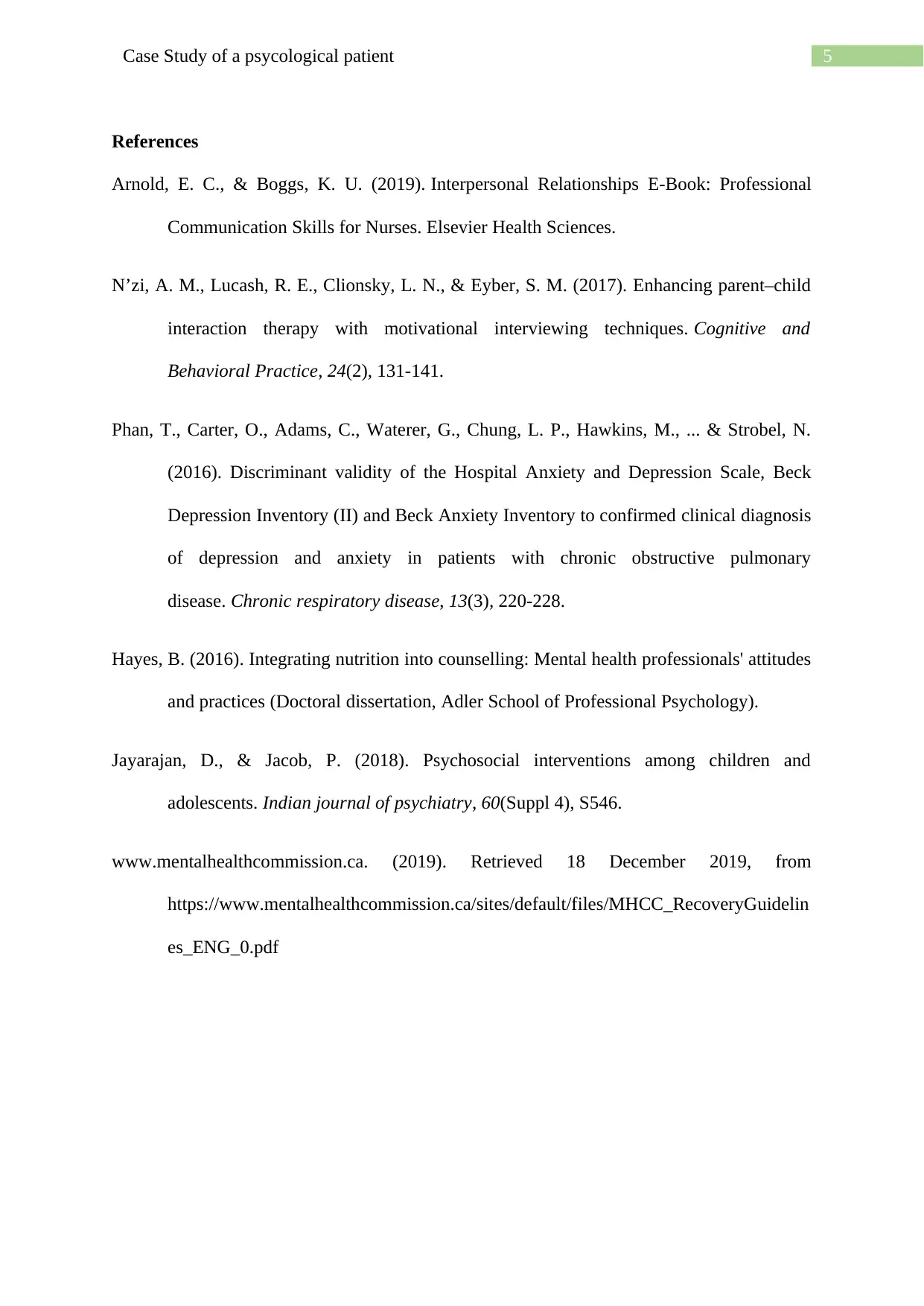
5Case Study of a psycological patient
References
Arnold, E. C., & Boggs, K. U. (2019). Interpersonal Relationships E-Book: Professional
Communication Skills for Nurses. Elsevier Health Sciences.
N’zi, A. M., Lucash, R. E., Clionsky, L. N., & Eyber, S. M. (2017). Enhancing parent–child
interaction therapy with motivational interviewing techniques. Cognitive and
Behavioral Practice, 24(2), 131-141.
Phan, T., Carter, O., Adams, C., Waterer, G., Chung, L. P., Hawkins, M., ... & Strobel, N.
(2016). Discriminant validity of the Hospital Anxiety and Depression Scale, Beck
Depression Inventory (II) and Beck Anxiety Inventory to confirmed clinical diagnosis
of depression and anxiety in patients with chronic obstructive pulmonary
disease. Chronic respiratory disease, 13(3), 220-228.
Hayes, B. (2016). Integrating nutrition into counselling: Mental health professionals' attitudes
and practices (Doctoral dissertation, Adler School of Professional Psychology).
Jayarajan, D., & Jacob, P. (2018). Psychosocial interventions among children and
adolescents. Indian journal of psychiatry, 60(Suppl 4), S546.
www.mentalhealthcommission.ca. (2019). Retrieved 18 December 2019, from
https://www.mentalhealthcommission.ca/sites/default/files/MHCC_RecoveryGuidelin
es_ENG_0.pdf
References
Arnold, E. C., & Boggs, K. U. (2019). Interpersonal Relationships E-Book: Professional
Communication Skills for Nurses. Elsevier Health Sciences.
N’zi, A. M., Lucash, R. E., Clionsky, L. N., & Eyber, S. M. (2017). Enhancing parent–child
interaction therapy with motivational interviewing techniques. Cognitive and
Behavioral Practice, 24(2), 131-141.
Phan, T., Carter, O., Adams, C., Waterer, G., Chung, L. P., Hawkins, M., ... & Strobel, N.
(2016). Discriminant validity of the Hospital Anxiety and Depression Scale, Beck
Depression Inventory (II) and Beck Anxiety Inventory to confirmed clinical diagnosis
of depression and anxiety in patients with chronic obstructive pulmonary
disease. Chronic respiratory disease, 13(3), 220-228.
Hayes, B. (2016). Integrating nutrition into counselling: Mental health professionals' attitudes
and practices (Doctoral dissertation, Adler School of Professional Psychology).
Jayarajan, D., & Jacob, P. (2018). Psychosocial interventions among children and
adolescents. Indian journal of psychiatry, 60(Suppl 4), S546.
www.mentalhealthcommission.ca. (2019). Retrieved 18 December 2019, from
https://www.mentalhealthcommission.ca/sites/default/files/MHCC_RecoveryGuidelin
es_ENG_0.pdf
⊘ This is a preview!⊘
Do you want full access?
Subscribe today to unlock all pages.

Trusted by 1+ million students worldwide

6Case Study of a psycological patient
1 out of 7
Related Documents
Your All-in-One AI-Powered Toolkit for Academic Success.
+13062052269
info@desklib.com
Available 24*7 on WhatsApp / Email
![[object Object]](/_next/static/media/star-bottom.7253800d.svg)
Unlock your academic potential
Copyright © 2020–2026 A2Z Services. All Rights Reserved. Developed and managed by ZUCOL.





